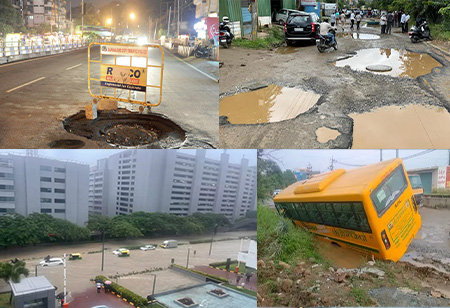
Bengaluru may be India’s tech hub, but its roads tell a different story. The same scenes are repeated every monsoon. Potholes open up. Quick fixes wash away. Deadlines are missed. And leaders come back to renew their vows. For lakhs of residents, the “Silicon Valley of India” feels like a city stuck in a loop.
The issues of roads in Bengaluru are not new. Since the city expanded, civic agencies kept digging up roads for water, power, and telecom lines. These stretches were hastily repaired with cheap mixes. When the rains came, the patches collapsed. Over the years, the issue turned from occasional potholes into a city-wide pattern of broken streets.
Funds are not the issue, at least on paper. In his budget, Chief Minister Siddaramaiah raised Bengaluru’s annual infrastructure grant from ₹3,000 crore to ₹7,000 crore. Deputy Chief Minister D.K. Shivakumar announced ₹1,100 crore for road repair and construction. He also promised that 349 km would be freshly asphalted at a cost of about ₹649 crore. At the national level, thousands of crores have been cleared for new highways and corridors around the city.
The numbers are impressive. But residents ask a simple question: where is the impact?
And this is where the anger builds. People see announcements but not change. Large allocations are made, yet many neighborhoods look the same. In some wards, the number of potholes has even grown.
Two truths stand out. First, projects often stall. Files move slowly, tenders drag on, and work starts late. By the time it begins, rains wash away whatever patching is done. Second, when funds are used, the results are hardly visible. Freshly laid roads are dug up again within weeks. Repairs vanish in the first shower. Contractors do just enough to mark “work completed” on paper, leaving residents to face the same mess again.
This gap between budgets and reality has destroyed trust. For most people, it does not matter whether the allocation is ₹7,000 crore or ₹70,000 crore if they are still bouncing over the same old potholes.
Also Read: Smart & Sustainable Highways: The Future of Road Infrastructure
Political leaders across parties have spoken sharply on the issue.
These words raise expectations and also underline how deep the crisis runs.
Recently, logistics firm BlackBuck announced that it would shift its office out of Bellandur on the Outer Ring Road because of poor road conditions and long commutes. The move triggered concerns that more firms could follow.
Deputy CM D.K. Shivakumar responded that the government was “least bothered about threats or blackmailing” and said companies are free to go if they want. He maintained that no other city in India can match Bengaluru in terms of talent, facilities, and ecosystem.
He also acknowledged that stretches like ORR and Mahadevapura have serious issues. To address them, he announced that contractors must fill potholes by November.
Some of the city’s best-known business leaders have been blunt. Biocon’s Kiran Mazumdar-Shaw said: “Namma Bengaluru has the best talent and the best weather but the worst infrastructure.” Former Infosys CFO Mohandas Pai, after seeing a video of repairs, called them: ““Pothole engineering in Bengaluru. Pathetic. Big shame. Is this road repair? Very primitive.”
Such sharp words from industry veterans highlight the risk. If Bengaluru’s infrastructure keeps collapsing, investors may move to other cities.
For ordinary residents, the struggle is not abstract. It is daily life.
These voices show that potholes are not just about traffic delays. They are about safety, health, and dignity.
Also Read: NHAI Awards Ceigall India Northern Ayodhya Bypass Project
The reasons are well known. Quick patches are chosen over full resurfacing. Multiple agencies dig up the same road without coordination. Contractors are picked on lowest bids, not quality. And when the rains arrive, the weak work is exposed within days.
Despite crores being poured in, the results are invisible because the system rewards speed and optics, not longevity. The result is a city where citizens are paying twice — once through taxes and again through vehicle repairs, medical bills, and wasted hours in traffic.
The path ahead is not complicated. Performance-based contracts can force contractors to guarantee quality for at least five years. Agencies need to follow “no-dig” rules so that once a road is laid, it is not cut open again in a few weeks. A fixed portion of funds should go to regular maintenance, not just flashy projects. And ward-level dashboards with photos and timelines can make spending transparent.
Bengaluru is home to some of the sharpest minds in the world. Yet it is also a city where people risk accidents every day just by walking or driving. The money is there. The promises are there. But without accountability, the roads remain the same. Until that changes, Bengaluru will carry the unwanted title of “City of Potholes.”
We use cookies to ensure you get the best experience on our website. Read more...